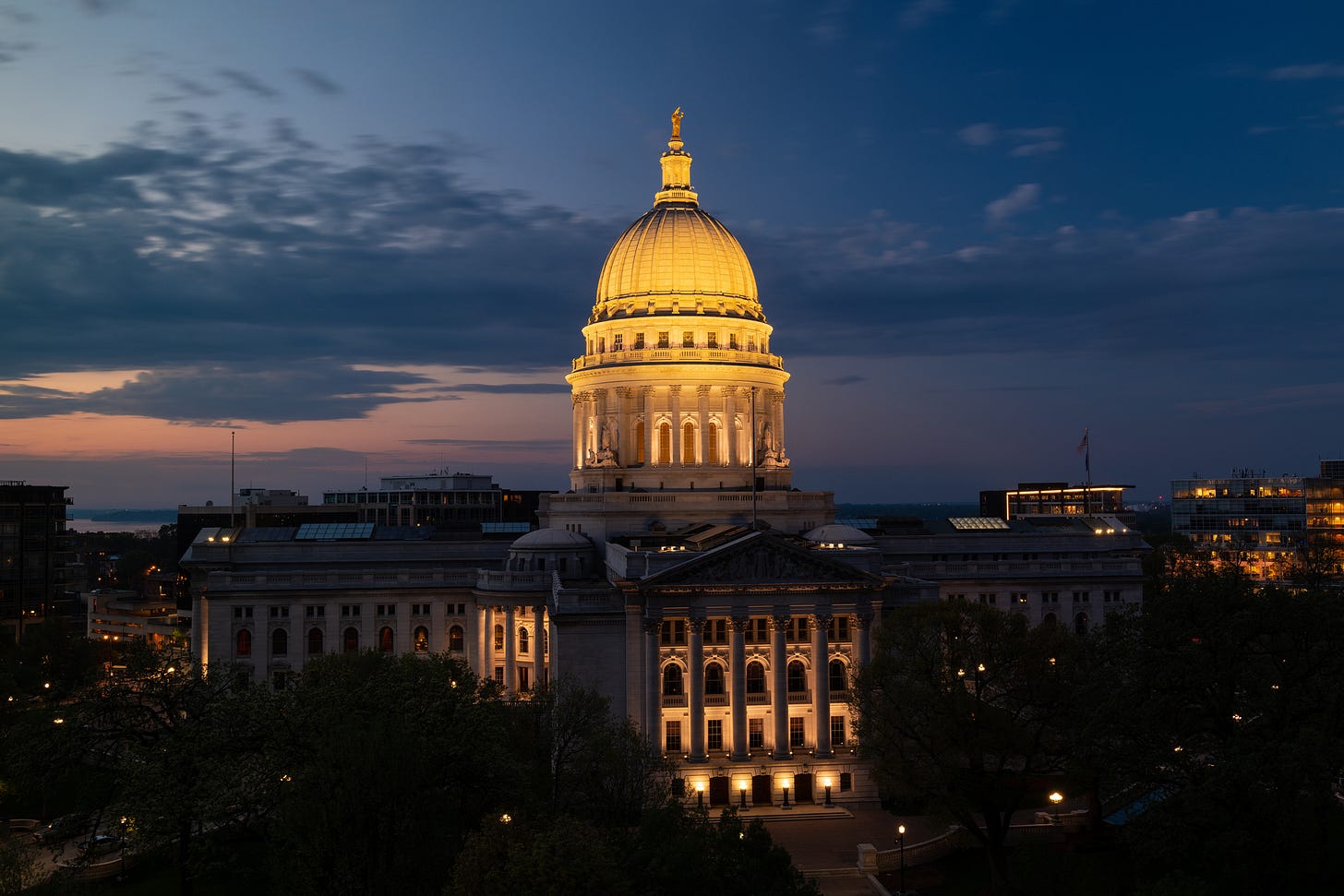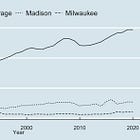The shared revenue and Milwaukee sales tax bill has real problems. But it has to pass.
Pass the legislation now and live to fight another day. Without it, a genuine catastrophe is waiting.
The Recombobulation Area is a ten-time Milwaukee Press Club award-winning weekly opinion column and online publication written and published by veteran Milwaukee journalist Dan Shafer. Learn more about it here.
There’s a tremendously important bill making its way through the Capitol in Madison. It’s been in negotiations for months, and now, after the framework of an agreement was announced by legislative Republicans and the Democratic governor, it is on the cusp of passing.
At the core of the bill is a fix to the state’s broken shared revenue system to better fund local government, and allowing Milwaukee, both City and County, to raise a local sales tax. It also creates a host of Milwaukee-specific policy requirements as conditions to meet in order to make that sales tax a reality.
If you’ve been following our coverage of this bill in recent months at The Recombobulation Area, featuring a multi-part series of analysis from Marquette University professor Phil Rocco, you already know that this package is about much more than simply moving a few numbers around. It’s not just about the state, sitting on a $7 billion surplus, committing a greater level of funding to the 72 counties and more than 1,800 municipalities in Wisconsin after selling them short for years and years. In many ways, this legislation would fundamentally realign the relationship between state and local government. Pieces of the bill introduced by Assembly Republicans take particular aim at Milwaukee — singling out the state’s largest, most diverse city and county in ways directed at no other community in the state — as the City and County seek to fend off a fiscal disaster that is in many ways the creation of those same Assembly Republicans.
But these are real problems, and there’s urgency to pass a bill now. The system for the way the state funds local government has been broken for some time, with funding flat for decades, and now, the federal pandemic relief dollars that have been a lifeline for local governments are beginning to run out. Gov. Tony Evers made addressing shared revenue a top issue in his re-election campaign, and with good reason. And while this is far from a Milwaukee-specific issue, with the sheer size of the city, the situation is magnified, and the City and County each are facing looming fiscal cliffs – in 2025 for the City and in 2027 for the County. The City could face cuts of up to 25% of its total budget, and the County would no longer be able to fund services not mandated by state law. The outlook for Milwaukee without a revenue solution is dire.
So what’s happening now has been built up for years. The “Fair Deal” push in 2018. The new coalition to push for a local sales tax in 2019. The elections of County Executive David Crowley (in 2020) and Mayor Cavalier Johnson (in 2022). The agreement to bring the Republican National Convention to the city in 2024. Intense negotiations over the last several months. It’s all cresting at this moment, as leaders have navigated a challenging high-wire act to get this bill over the finish line.
So here’s the big question: Is this a good deal?
So much of the news of the past few months has centered around shifting negotiations, political posturing, and genuine, roll-up-your-sleeves work being done. It’s important that we take a step back, get out of the weeds for a moment, and assess this from a bigger picture standpoint.
Does this solve the problem that is our broken shared revenue system? Does this adequately fund local government for the state’s 72 counties and more than 1,800 municipalities? Does it not only bring Milwaukee back from the fiscal cliff, but put the city and county in position to thrive? Does it maintain a spirit of local control in communities across the state?
In many ways, the bill misses the mark. There is simply not enough funding for local governments across the state. The state’s multi-billion dollar budget surplus was in many ways built on the backs of defunding local government and this doesn’t go far enough to realign that imbalance. The 11th hour deal struck to incorporate K-12 education funding into the agreement has serious problems (which I won’t get into here) and may cause some to, with good reason, vote differently on a second bill. The $300 million “Innovation Fund” is bloated and unclear.
The Milwaukee-specific policy requirements are insulting, and are completely at odds with the very spirit of empowering local government and granting local control. Many of these requirements are the type of “anti-woke” nonsense that has more to do with servicing a conservative media culture war agenda than solving any problems. Some of the requirements seem specifically targeted at progressive people of color, which is especially problematic in a state with some of the deepest racial disparities seen anywhere in the nation, in a county where nearly 70% of the state’s Black population lives. There’s a lot here that undermines the tireless efforts of people who have been working for years to make their city and community a better place.
For Milwaukee in particular, this is just a deeply frustrating way for the state to govern its largest city, its economic and cultural powerhouse — and the place where so many of the downstream problems created by Republicans upstream tend to end up. This may help Milwaukee avoid falling off a fiscal cliff, but it was state Republicans that pushed Milwaukee to that cliff in the first place. There are far better ways our state government could be putting the city in position to thrive, not simply spare it from disaster.
This is, on balance, not an ideal agreement. It might not even be one that can be accurately characterized as “good.”
And yet, for all that’s wrong with this bill, it absolutely, 100% has to pass.
It has to pass because the downside of not making a deal is outright catastrophe. Governments statewide will be left once again without a long-term revenue solution, and Milwaukee would face devastating cuts and perhaps even face insolvency. Those cuts would ripple through the city and region and state in cataclysmic ways that we haven’t even begun to process. The risk is too great. We are running out of time. This has to get done and it has to get done now.
If Assembly Speaker Robin Vos had not blocked this effort two years ago, saying a local sales tax for Milwaukee is “never going to happen,” perhaps we would be facing such an urgent crisis. But this is where we are.
The legislature should pass this bill and Gov. Evers should sign it into law. Pieces of it will still require an uphill climb, where a two-thirds vote will be required of the Milwaukee Common Council and Milwaukee County Board in order to raise the local sales tax, but each of those bodies of government should pass the sales tax increase, too. The Milwaukee-specific policy provisions will still be there regardless of whether local governments approve the increase that will help stabilize budgets and avoid immediate disaster.
The people criticizing this deal have been right to do so, but only if it’s in effort of improving it before its passage, not seeking to torpedo it entirely. I will always value taking the best, realistic path to action over adhering to ideological rigidity. Never ever let perfect be the enemy of good. Would it be better if what we were agreeing to represented something better than the least objectionable option? Of course. But we can wake up tomorrow and continue to work to build a better reality, a better city, a better county, a better state. And that will mean fighting back against the worst parts of this bill with whatever tools we have.
There’s a lot in this package that’s tough to stomach. But that’s the nature of compromise in a purple state with divided government. Getting any kind of a deal to pass when Robin Vos, ever the biggest impediment to true progress in Wisconsin, is running the nation’s most gerrymandered state legislature was never going to be easy. Truly, Mayor Johnson and County Executive Crowley deserve credit for moving this from “never” to something.
It is, we should note, deeply unfortunate that Republican leaders seem uninterested in doing little more than avoiding a collapse of their own design when it comes to Milwaukee. We should hope they actually see the city for what it is, a beautiful, resilient and flawed place that is being blamed for the results of decisions it is often not allowed to make. But such is not the political reality of the moment. Milwaukee, as always, deserves better.
But let’s not also forget that the ground is shifting in Wisconsin. Come Aug. 1, Janet Protasiewicz will be seated on the Wisconsin Supreme Court and a new set of legal challenges on everything from gerrymandered maps to separation of powers to local control could be brought before the court’s new liberal majority. Perhaps there’s a situation in the not-too-distant future where fair maps create more balance in the state legislature or where the courts restore the balance of power between the state and local governments, and this situation can be revisited. Passing this legislation now is by no means the end of the road to improve the state’s relationship with local government and better support Milwaukee.
With this deal, Milwaukee lives to fight another day. Without it, we’re staring at the abyss and local governments across the state will suffer. Let’s pass it and live to fight another day. There’s too much at stake to let this moment pass.
Dan Shafer is a journalist from Milwaukee who writes and publishes The Recombobulation Area. He previously worked at Seattle Magazine, Seattle Business Magazine, the Milwaukee Business Journal, Milwaukee Magazine, and BizTimes Milwaukee. He’s also written for The New York Times, The Daily Beast, Heartland Signal, Belt Magazine, WisPolitics, and Milwaukee Record. He’s won 17 Milwaukee Press Club Excellence in Journalism Awards. He’s on Twitter at @DanRShafer.
Subscribe to The Recombobulation newsletter here and follow us on Facebook and Instagram at @therecombobulationarea.
Already subscribe? Get a gift subscription for a friend!
Follow Dan Shafer on Twitter at @DanRShafer.
#BucksInSix





